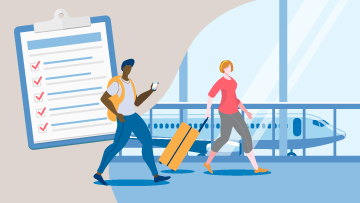Settling in Canada
Once we’ve approved your application, you can start the process of settling permanently in Canada. Your next steps will depend on where in the world you are.
Prepare to live in Canada
You can get free help to prepare to live in Canada. These services will help you learn about life and work in Canada.
Pre-arrival services
Before you arrive, get free services to help you prepare for life in Canada.
Publications for newcomers
Find information in different languages to help you during your first weeks in Canada.
Arrive at the border
Everyone wants their border crossing to go smoothly, with as few delays as possible. The best way to make sure this happens is to know what to expect and prepare before you and your family members arrive at the border.
The Canada Border Services Agency provides helpful tools to help you when crossing the border.
After you’ve arrived
You need to complete a few important tasks as you settle into your new life as a permanent resident.
Get your permanent resident card
After your first landing in Canada, we’ll start the process to mail your permanent resident (PR) card, your new identification document, to your address in Canada.
Make sure we have your mailing address
If you didn’t provide your Canadian mailing address when you became a permanent resident, use our online address notification tool within 180 days to avoid the cancellation of your PR card. Otherwise, you’ll need to apply for another one and pay new processing fees.
Apply for a social insurance number
While you wait for your permanent residence card, you can use your signed confirmation of permanent residence to apply for a social insurance number to work in Canada or access government programs and benefits.
Get settlement support
Settling in a new country can be exciting, but challenging. Once you’re in Canada, our free services are here to help you transition smoothly into everyday life in Canada.
Protect yourself from fraud
In a world full of scams, it’s important to protect yourself. Discover simple ways to avoid scammers and learn what to do if you become a victim of fraud.
Learn more about immigration and citizenship fraud and scams.

Before You Arrive in Canada
This video can help you get ready for your new life in Canada. It covers key areas such as language, job search preparation, the education system and health coverage.
Help for new immigrants
You can contact friendly and experienced settlement professionals in Canada to get free newcomer services. These organizations offer services such as
- help finding a job
- language assessment or training
- help signing up kids for school
- help connecting with others in your community
Find newcomer services near you
Get more settlement help
Learn more about settling as a newcomer in Canada.
Confirm your permanent resident status
We’ll send you 2 emails:
- The first email will ask you to respond with some basic information.
- The second will let you know we’re ready to confirm your permanent resident (PR) status.
If you didn’t get our email, check your junk mail or spam folder to see if a message from us is there.
Learn more about how you confirm your permanent residence from inside Canada.
Get your permanent resident card
After we confirm your status, you’ll get an automated email when your electronic confirmation of permanent residence (e-COPR) is ready. This document is proof of your new status in Canada. It can take up to a few weeks for your e-COPR to be processed.
In the portal, we’ll also ask you for a photo so we can start making your first permanent resident (PR) card. You don’t need to apply for your first PR card.
Once your photo is approved, we’ll send your PR card to the mailing address in Canada you gave us.
Make sure we have your mailing address
If you didn’t provide your Canadian mailing address when you became a permanent resident, use our online address notification tool within 180 days to avoid the cancellation of your PR card. Otherwise, you’ll need to apply for another one and pay new processing fees.
Apply for a social insurance number
While you wait for your permanent residence card, you can use your signed confirmation of permanent residence to apply for a social insurance number to work in Canada or access government programs and benefits.
Protect yourself from fraud
In a world full of scams, it’s important to protect yourself. Discover simple ways to avoid scammers and learn what to do if you become a victim of fraud.
Learn more about immigration and citizenship fraud and scams.

Before You Arrive in Canada
This video can help you get ready for your new life in Canada. It covers key areas such as language, job search preparation, the education system and health coverage.